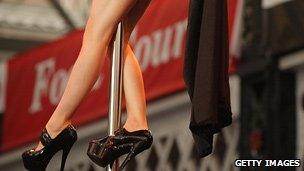Could the East End become a strip-club free zone?
- Published
Tower Hamlets wants to be the first council in London to ban lap-dancing clubs and it has just finishing asking its residents if they feel the same.
The east London Labour-led borough is one of the capital's most deprived as well as being the playground of the City and that clash, for many in the council, is uncomfortable.
Officially there are 11 lap-dancing clubs in the borough. Some are in dense residential areas around Whitechapel and Bow, others in trendy Shoreditch, the East End's alternative to Soho, or the financial district of Canary Wharf.
Independent councillor Rania Khan, who has been leading the campaign to shut the clubs, said: "You see a lot of the city workers coming into the borough because Tower Hamlets is on the city borders.
"It's really unfair on residents, these venues are in the heart of the community."
Last year, the law on lap-dancing clubs in England and Wales changed, with any venue that had lap-dancing, pole-dancing or strip tease being reclassified as a sex encounter venue.
Stag nights
The aim of the legislation was to give more power to local residents and local councils could also put a limit on the number of clubs they felt were appropriate.
BBC London has learned the majority of London councils have implemented some part of the legislation.
Nearby Hackney, in east London, had wanted to ban the clubs, but it compromised and agreed to a limit on the existing seven establishments.
According to the Tower Hamlets consultation document, the council "has adopted the government's new legislation and to implement it we have produced a draft policy which says there is no location within Tower Hamlets suitable to have sex establishments".
A group of residents in Bow, who live near to a licensed lap-dancing pub, said they agreed with the plans.
One mother, who wanted to remain anonymous, said: "I don't think it's safe, especially with the posters that are around. My children are looking at them and asking questions 'What is this? What's a lap dance?'"
Another resident, Kobir Ali, said: "I've got friends who've got younger daughters and men who come out of the pub are looking at them.
"They've just seen the show, what are they looking at? They're looking at her."
However stripper Edie, who has worked in East London for more than 10 years, said strip tease was an art form that should be celebrated and kept safe.
"It's really better if this thing is overground and controlled," she said.
Safety concerns
Inside The Beehive pub, on Empson Street, Bow, the landlord said it had not had lap dancing for some time but kept the licence in case of stag nights.
One of the regulars said: "It's a bit of insult really, It's a working mans pub. You have a couple of pints on the way home from work and that's it.
"People have got to make a living. There was no sex just people dancing."
Several local club owners also told the BBC they would fight any plans in court.
"We are legitimate businesses and have good relations with the people who live and work near our clubs," said Dave Stewart, a spokesman for nine of the eleven clubs in the borough.

There are 11 lap-dancing clubs in Tower Hamlets
Jennifer Hayashi Danns, from west London, spent two years lap dancing in clubs in London and north-east England while studying for her degree.
She has recently published a book called Stripped, which she says is an anthology of women's experiences of the clubs
She said: "My vision would be for the UK to have absolutely no lap-dancing clubs however I would be careful about just banning them and using prohibition to achieve that.
"If you ban the clubs, that disrespect of women and objectification will just manifest itself in another form."
There is a fear among some that banning clubs would not help the women involved and workers' unions such as the GMB fear a ban would make the industry more dangerous.
- Published22 September 2011
- Published12 November 2010